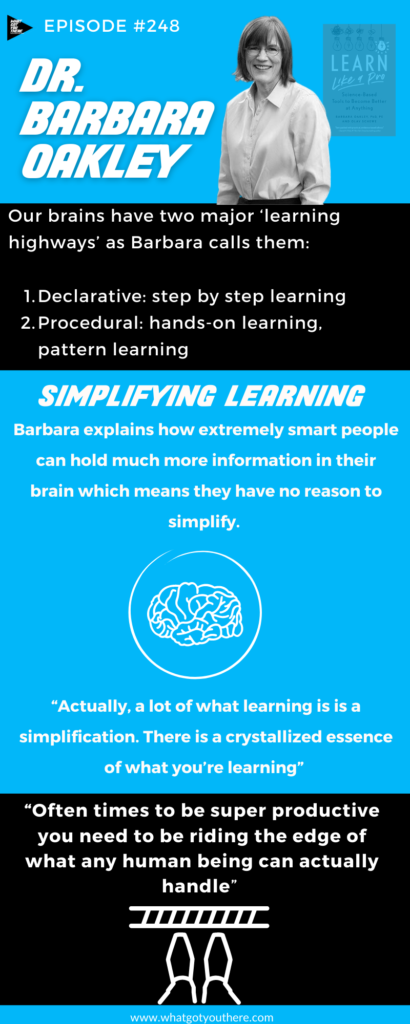#248 Barbara Oakley – Unveiling the Science Based Tools to Learn Like a Pro

Key Takeaways:
Our brains have two major ‘learning highways’ as Barbara calls them:
- Declarative: step by step learning
- Procedural: hands-on learning, pattern learning
“All of these are things we never did from an evolutionary perspective, and so that means the way that we do these things is we repurpose circuits that we normally use for other things”
Two types of dopamine is released in the body that impact our learning:
- Tonic Dopamine: helps motivate us
- Phasic Dopamine: helps you learn, how to solve a problem
5:16 Staying in a Flow State
Barbara talks about how reading the book The One Thing helped her to change her mindset about the busy-ness of life from overwhelming to seeing it as a flow.
“Often times to be super productive you need to be riding the edge of what any human being can actually handle”
9:40 Distillation & Simplifying Process
Barbara explains how extremely smart people can hold much more information in their brain which means they have no reason to simplify.
“Actually, a lot of what learning is is a simplification. There is a crystallized essence of what you’re learning”
Barbara’s personal process for sharing information through her writings is that she first writes the book and then she turns the book into an online course, changing the format and way the information is presented.
“When you’re learning from a book as opposed to learning online, they each have these valuable ways of giving you insights and it’s so fun to be able to paint, so to speak, in both formats”
15:15 The Different Ways We Learn
Our brains have two major ‘learning highways’ as Barbara calls them:
- Declarative: step by step learning
- Procedural: hands-on learning, pattern learning
“It’s pretty clear to everyone that people do learn differently and there are some patterns to how they learn differently”
19:30 Gains in Knowledge Around Learning
Barbara talks about how the education system struggles to implement and integrate new insights from cognitive psychology around learning.
“You have to remember that what is currently in place always has a vested interest in keeping that system in place.”
26:25 Memorization
Were you ever told that memorizing information during school was an ineffective way to learn? Barbara debunks this myth by saying that memorization and the process of drilling information into students is actually the fundamental step for learning, comparing it to basketball players learning basic drills in order to become higher performers.
“Getting a good education is what IQ scores depend one and if you get rid of one of the major systems it’s no wonder that IQ scores began to decline even within families as the educational systems began to change”
27:55 Learning At Different Periods of Life
Barbara says that when we are young, we learn better procedurally. As we age, our declarative side becomes more and more developed.
30:20 Repurposing Brain Circuits
Facial recognition and learning language are two things that we naturally are programmed to learn. Barbara also talks about how we were not designed to read, write, or learn mathematics.
“All of these are things we never did from an evolutionary perspective, and so that means the way that we do these things is we repurpose circuits that we normally use for other things”
37:58 Dopamine & Learning
Two types of how dopamine is released in the body
- Tonic Dopamine: helps motivate us
- Phasic Dopamine: helps you learn, how to solve a problem
50:48 Benefits of Chocolate
Barbara talks about how chocolate can be helpful for cognitive performance. Every morning she takes a capsule of Cocoavia chocolate and she feels like she is sharper throughout the day.
55:09 Approaching Reading
In order to maximize your learning from reading, Barbara says that it is important to think back and think about what you learned from your reading while you’re doing something else, such as exercising. She also recommends taking an online course after reading so you can apply and put the ideas you read about in action.
“You don’t know the key ideas of a book until you put them in your own brain, until you have created links to withdraw those ideas from your brain.”
1:00:04 Outside of Her Expertise
Barbara says that traveling has had the largest impact on her work and influencing her frameworks.
“I’ve come to the conclusion that in life, we can only approach truth by seeing the world through as many perspectives as we possibly can”
1:02:28 Book Recommendations
War and Peace on War by Peter Turchin
1:05:40 Barbara’s Interview Choice
If Barbara could interview anyone dead or alive, just not a family or friend, she would choose Abraham Lincoln or Teddy Roosevelt.
Connect with Barbara
Book – Learn Like A Pro: Science Based Tools to Become Better at Anything
Book – Uncommon Sense Teaching: Practical Insights in Brain Science to Help Students Learn
